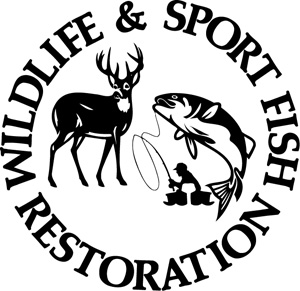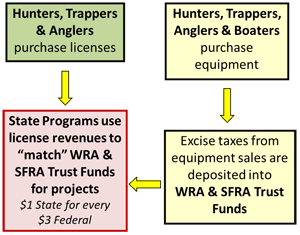The DNREC Division of Fish and Wildlife uses a combination of federal funds and revenue from recreational licenses and permits to fund wildlife conservation, habitat restoration, public access, hunting, fishing and other services.
 Delaware receives federal funds from the Wildlife Restoration Act, the Sport Fish Restoration Act, and State Wildlife Grants to support wildlife conservation, hunting, fishing, boating and education.
Delaware receives federal funds from the Wildlife Restoration Act, the Sport Fish Restoration Act, and State Wildlife Grants to support wildlife conservation, hunting, fishing, boating and education.
The Division of Fish and Wildlife provides required matching funds through permitting and licensing fees, conservation access pass fees, and the time and contributions of state employees and local volunteers.
Early 1900s
Unregulated hunting and destruction of habitat led to the decline of many game animals. License sales alone could not support national wildlife conservation efforts.
1937 – The Wildlife Restoration Act Passed
Senators Pittman (Nevada) and Robertson (Virginia) sponsored the Wildlife Restoration Act in the US Congress. This was a user pay/user benefit model where excise taxes on sporting firearms, ammunition, and hunting gear would now fund national wildlife restoration and conservation efforts.
1950 – The Sport Fish Restoration Act
Senators Dingell (Michigan) and Johnson (Colorado) sponsored the Sport Fish Restoration Act in the US Congress. Modeled after the Wildlife Restoration Act, it allowed excise taxes on fishing tackle to fund restoration efforts for sport fish and their habitats.
The Division of Fish and Wildlife receives Federal grant funds from the Wildlife Restoration Act (WRA) trust fund on a yearly basis to support wildlife and habitat restoration projects and hunter education. The WRA is funded through excise taxes placed on sporting firearms, ammunition and hunting gear. Amendments in 1970 and 1972 added excise taxes on handgun and archery equipment sales to fund hunter education and shooting ranges. Using a user pay/user benefit approach, these excise taxes are placed into the WRA trust fund which is then distributed to the states.
Wildlife Restoration Act funds can only be used for Fish and Wildlife projects supporting wildlife and habitat restoration and hunter education. Both game and non-game species benefit from WRA funding. However, law enforcement, public relations, and revenue-producing activities do not qualify for WRA funding.
The Wildlife Restoration Act funding formula is 50 percent of the square mileage of the state’s land and inland waterways plus 50 percent of the number of licenses sold in the state. No state receives more than 5 percent or less than half of 1 percent of the total funds available. Delaware receives half of 1 percent.
While a formula determines how much WRA money each state can receive, all states must apply for grant funding. Approved projects receive 75 percent WRA funding, with the states required to provide the remaining 25 percent of project costs. Most of the 25 percent matching funds comes from the sale of hunting licenses in Delaware.
The DNREC Division of Fish and Wildlife receives federal grant funds from the Sport Fish Restoration Act (SFRA) trust fund on a yearly basis to support sport fish species and habitat restoration as well as boating access and aquatic education. The SFRA began with funding from excise taxes placed on fishing equipment, import duties on recreational boats as well as a portion of marine fuel tax revenues. An amendment in 1984 added excise taxes on additional fishing equipment, import duties on recreational boats, and a portion of marine fuel tax revenues. Using a user pay/user benefit approach, these excise taxes are placed into the SFRA trust fund which is then distributed to the states.
Sport Fish Restoration Act funds can only be used for Fish and Wildlife projects supporting sport fish species and habitat restoration, boating access and aquatic education. While a formula determines how much SFRA money each state can receive, states must apply for grant funding. Each state must spend a minimum of 15 percent of its yearly SFRA funding on boating access and no more than 15 percent on aquatic education.
The Sport Fish Restoration Act funding formula is 40 percent of the square mileage of the state’s land and inland and coastal waterways plus 60 percent of the number of licenses sold in the state. No state receives more than 5 percent or less than half of 1 percent of the total funds available.
Approved projects receive 75 percent SFRA funding, with the states required to provide the remaining 25 percent of project costs. Most of the 25 percent matching funds comes from the sale of recreational fishing licenses in Delaware.
The Division of Fish and Wildlife receives State Wildlife Grant (SWG) funds yearly from the General Treasury for projects supporting Species of Greatest Conservation Need and their habitats (as identified in the state’s Wildlife Action Plan). To participate, states were required to create a Wildlife Action Plan in 2005, to be updated in 2015. Each state must apply yearly for grant funds which are appropriated through annual appropriations bills.
State Wildlife Grant funds can only be used for Fish and Wildlife projects supporting Species of Greatest Conservation Need and Habitats of Conservation Concern in Delaware.
The State Wildlife Grant funding formula is based on one-third of the square mileage of the state’s land and inland waterways plus two-thirds of the state’s population. No state receives more than 5 percent or less than half of 1 percent of the total funds available. Delaware receives half of 1 percent.
Approved grants for implementation of projects receive 65 percent SWG funding, with the states required to provide the remaining 35 percent of project costs to match the 65 percent allotment. Approved grants for project planning receive 75 percent SWG funding, with the states required to provide the remaining 25 percent of project costs to match the 75 percent allotment.
 To match the funds allotted from federal grants through the Wildlife Restoration Act and the Sport Fish Restoration Act, each state must first use license revenues.
To match the funds allotted from federal grants through the Wildlife Restoration Act and the Sport Fish Restoration Act, each state must first use license revenues.
As license sales decline, other sources of matching funds may be used, including state merit employee time, donations, volunteer hours one-time state appropriations, state general funds and in-kind match from universities.
To match funds allotted from federal State Wildlife Grants, states may use the following sources of matching funds: state merit employee time, donations, tax check-off “Wild Gifts,” volunteer hours, one-time state appropriations, Heritage General Funds and in-kind match from universities.
Related Topics: conservation, fish and wildlife, funds, wildlife